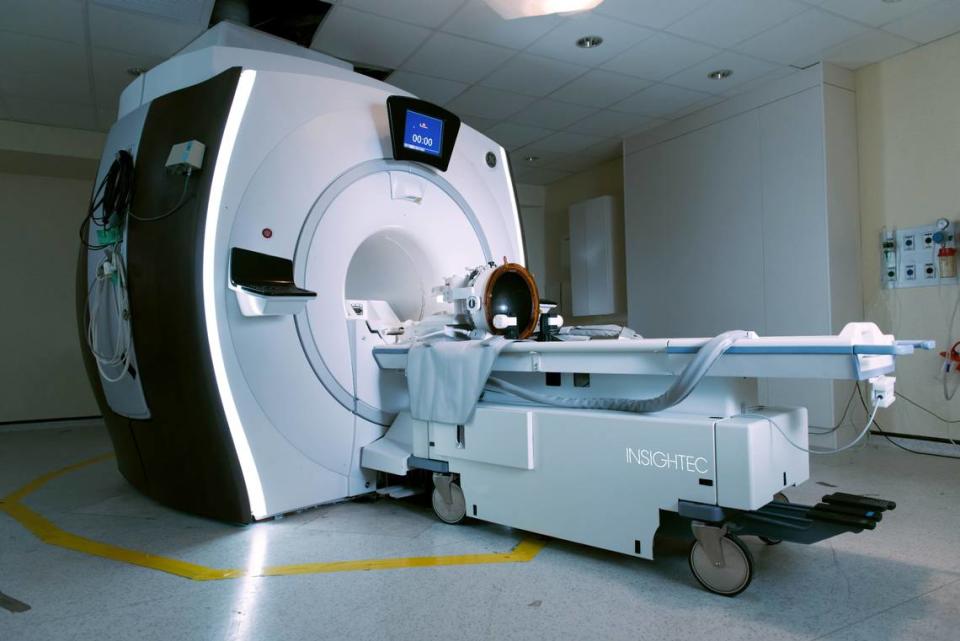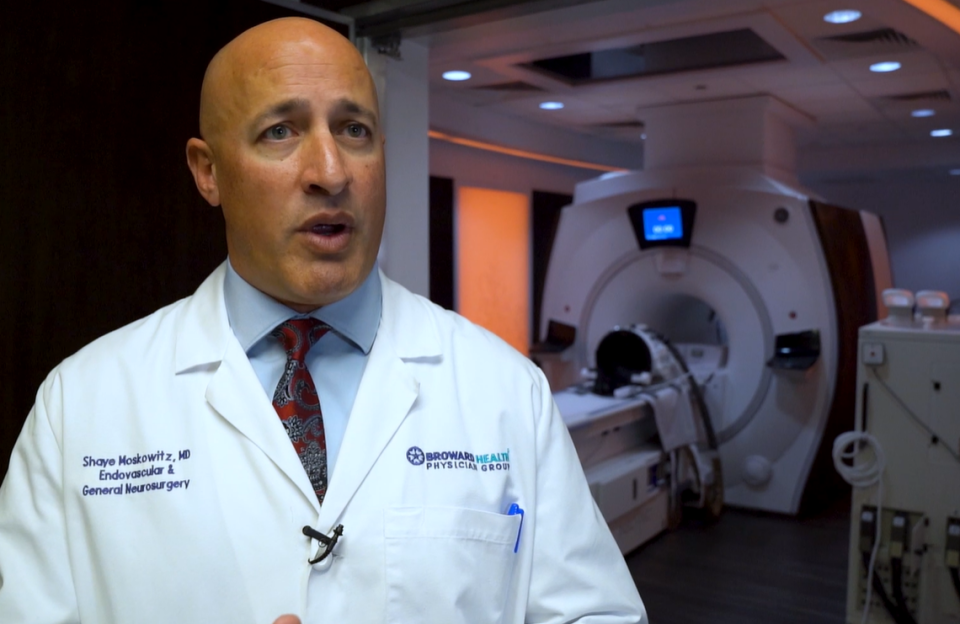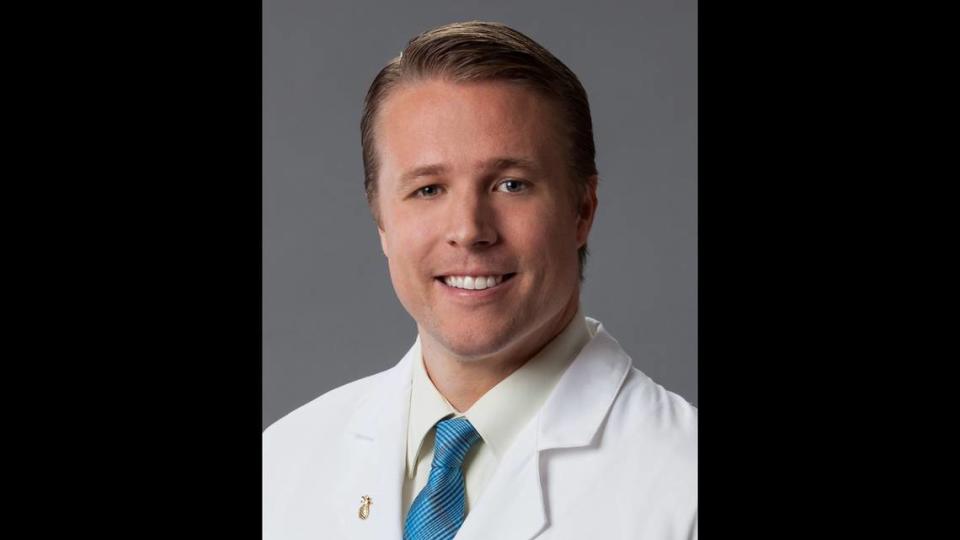Can treatment ‘disrupt’ Alzheimer’s in the brain? Help these Florida doctors find out
A study is underway in South Florida to treat Alzheimer’s disease, and hospitals are looking for patients to participate.
Broward Health Medical Center, Baptist Health South Florida and Delray Medical Center, along with other hospitals in the country, are recruiting for the clinical trial patients ages 50 to 85 who have been diagnosed with likely having Alzheimer’s.
Researchers want to test whether they can safely and effectively use focused ultrasounds to temporarily open or “disrupt” the barrier that surrounds the brain in areas where there’s an abnormal build-up of Alzheimer-causing proteins. They want to see if this will reduce the clustered proteins, and improve or slow progression of the disease.
“We’re looking at ways to open the blood-brain barrier temporarily, to allow these bad amyloid proteins to leach out of the brain into the bloodstream and then they get carried and washed away. And by doing so, you can reduce the amount of protein in people’s brains and we believe that by doing that, you can alter the course of the disease itself,” said Dr. Shaye Moskowitz, medical director of neurosciences at Broward Health. He’s one of the study’s principal investigators.
Here’s what else to know in South Florida:
What causes Alzheimer’s disease? What is the brain-blood barrier?
▪ Doctors believe Alzheimer’s disease is caused by an abnormal build-up of proteins, known as amyloid and tau, in and around brain cells. The over production of these proteins disrupts communication between the cells, affecting memory, recall, language and other brain functions.
▪ The blood-brain barrier is a protective shield around the brain that separates it from the rest of our body. Think of it like a door. While the barrier lets water and oxygen pass into the brain, it keeps bacteria, viruses and drugs out, to help keep the brain safe.
How the trial works
▪ Procedures: Patients diagnosed with probable Alzheimer’s will undergo three low frequency focused ultrasound procedures at Broward Health Medical Center, Baptist Health South Florida or Delray Medical Center to temporarily open parts of their blood-brain barrier. Researchers will use MRIs to check if the barrier opens, and later closes.
▪ Measurement: The ultrasound will only be used in areas where doctors detect, through the use of MRI imaging, a high concentration of amyloid. Doctors say previous trials have shown that focused ultrasounds can open the blood-brain barrier. In this trial, researchers will be looking to measure the safety and efficacy of the procedure and will follow the patients over the course of five years to look for changes in their disease progression, according to Moskowitz.
▪ Funding: Doctors say the non-invasive clinical trial is funded by medical device company InSightec and is part of a collaboration with Florida’s recently established Alzheimer’s Center for Excellence. The program was established last year as part of the state’s record funding for Alzheimer’s and related dementia. Gov. Ron DeSantis announced the record funding in a June 2022 Fort Lauderdale news conference.

Eligible patients
▪ Recruitment: All three South Florida hospitals are recruiting patients 50 to 85 who have been diagnosed with likely having Alzheimer’s disease and are able to communicate during the procedure.
▪ Requirements: The study has a list of requirements and exclusions. For example: Patients taking Alzheimer’s medication must be on the medication for at least two months with a stable dose for at least three months to be eligible. Patients cannot have a history of liver disease, a bleeding disorder or have a significant heart disease.
▪ Enroll: Patients interested in enrolling in the study, which is expected to involve up to 30 patients, should ask their doctor for a referral to one of the participating hospitals. For Baptist Health South Florida, for example, have your doctor email margarita.mederos@baptisthealth.net. For Broward Health, have your doctor call 954-786-6736.
READ NEXT: Why do some people get Alzheimer’s and others don’t? How a new UM tool checks your risk
Alzheimer’s by the numbers
▪ About 6.7 million people in the U.S. are living with Alzheimer’s, a count that is expected to balloon to 12.7 million by 2050, according to the Alzheimer’s Association. The disease is the most common cause of dementia and is one of the top 10 leading causes of death in the country, according to the U.S. Centers for Disease Control and Prevention. More than 580,000 people live with Alzheimer’s in Florida.
▪ While there’s no cure for the disease, treatments are available to help treat the progression. Doctors hope the results of the blood-brain barrier study will lead to better treatment.
“There are so few options for such a devastating disease. Many people say that the entire family suffers along with the patient, in many cases, more than the patient who may not even be aware of what’s going on ... And so to have the opportunity to make even a small difference in that knowledge on the path towards maybe stopping or reversing the symptoms of Alzheimer’s is an honor, and a privilege. And so I think that, if we’re able to make even a small difference, then we build on each success, then go to the next level, and get one step closer to improvement,” said Dr. Justin Sporrer, neurosurgeon and director of functional neurosurgery at Baptist Health Miami Neuroscience Institute, which is also participating in the study. Sporrer is one of the hospital’s subinvestigators for the trial.
READ MORE: New study shows potential link between bad quality sleep and Alzheimer’s in Hispanics
What the study could mean for future Alzheimer treatment
▪ The goal: Medical device company InSightec, which is funding the trial and providing the ultrasound system, said it hopes the trial will give hospitals and researchers the ability to “non-invasively and temporarily disrupt the blood brain barrier, with the ultimate aim of targeted drug delivery into the brain.”
▪ The future: While the blood-brain barrier does a good job of keeping harmful substances away from the brain, it also locks most medications out, said Moskowitz and Sporrer. Temporarily opening the barrier could help doctors improve treatment.
“Because we can’t get medications in and if you can’t get medications in, there’s a lot of diseases that we have no ability to impact,” Moskowitz said.

Hospitals, universities involved in the study
▪ Local experts: Broward Health Medical Center, in partnership with the University of Florida; Baptist Health South Florida, in partnership with Florida International University; and Delray Medical Center, in partnership with Florida Atlantic University are enrolled in the trial.
READ NEXT: FIU medical school to partner with Baptist —what it means for patients, doctors, students
▪ Other hospitals: Also enrolled in the trial are UF Health Shands Hospital in Gainesville, Florida; Tampa General Hospital in Tampa, Florida; Weill Cornell Medicine in New York, Ohio State University Wexner Medical Center in Columbus, Ohio; University of Texas Southwestern Medical Center in Dallas, Texas; and West Virginia University Rockefeller Neuroscience Center in Morgantown, West Virginia. All of the hospitals, except Ohio State University Wexner Medical Center, are recruiting patients.


 Yahoo Sports
Yahoo Sports 